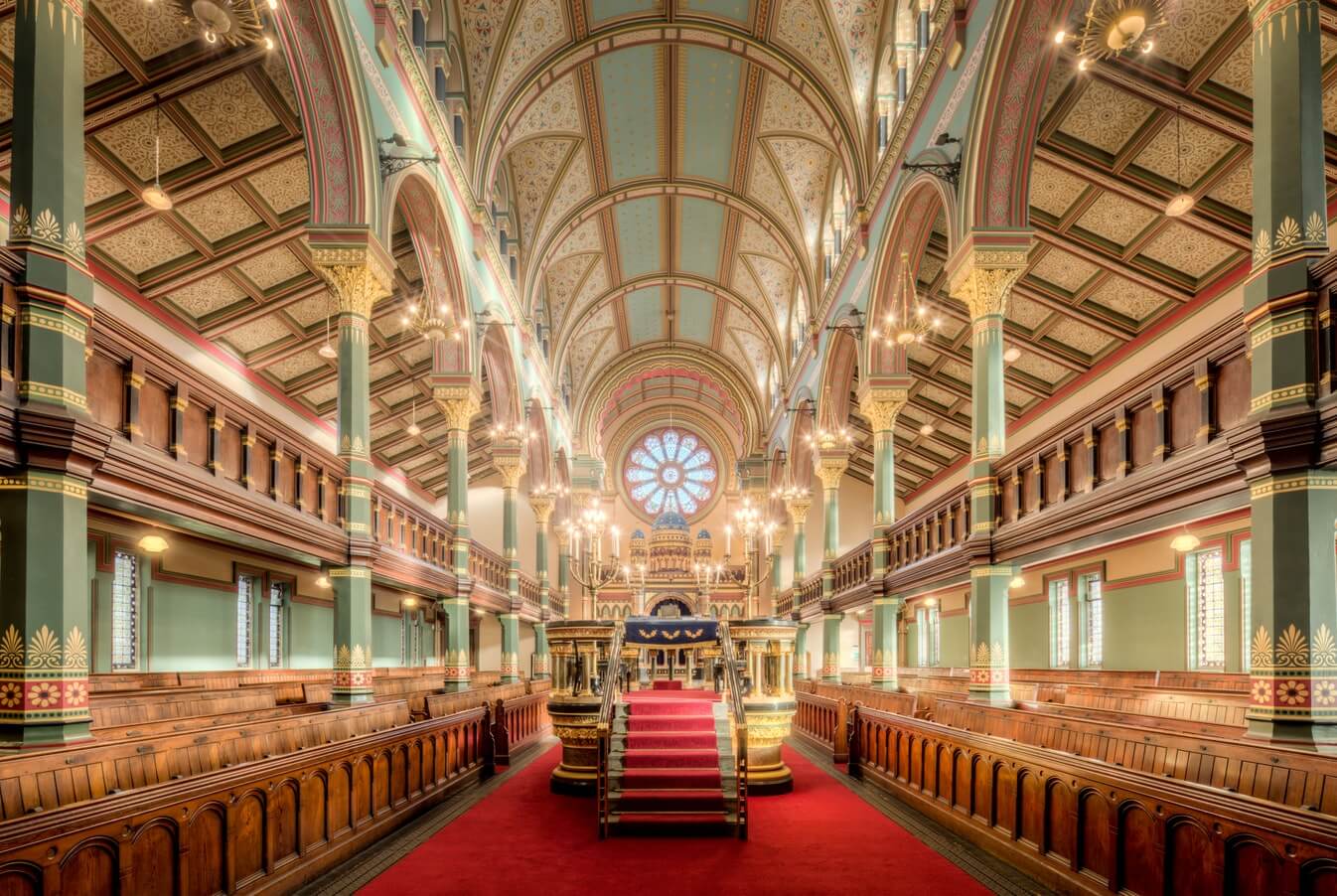Jewish Funeral Traditions
Here we give you a breakdown of the traditions that occur at a Jewish funeral ceremony.
All Jewish funeral ceremonies regardless of the family being Orthodox, Conservative, or Reform, are solemn and simple. There are no flowers displayed, music is not played, embalming is discouraged since there is no viewing, simple wood caskets
are used, often the body is clothed in a simple shroud instead of fancy clothes, and it is ideal that internment take place as soon as possible (Jewish Gilroes, 2018).
The Kriah symbolizes the personal pain and grief felt from the loss of a loved one. It is always done while standing because it shows strength during a time of grief. Before the tearing takes place, the family recites the following prayer:
Barukh atah Adonai Eloheinu melekh ha’olam dayan ha’emet.
This translates to :
Blessed are You, Adonai Our God, Ruler of the Universe, the True Judge.
The torn clothing or black ribbon is worn during the seven days of shiva
(My Jewish Learning, 2018).
As guests enter and take their seats for their funeral ceremony, the immediate family remains in a private room. Once all guests are seated, the family then takes their seats at the front row. The funeral ceremony is fairly brief. The actual structure depends on the Rabbi or Officiant. It will usually consist of prayers, psalms, and inspirational readings. Before the closing of the funeral ceremony, the eulogy, referred to as the hespeid for Jews, is given by a family member, a friend, or the Rabbi. The hespeid is not meant to give a full life story, but rather it should only highlight some of the great qualities of the deceased. The funeral ceremony concludes with the congregation standing and singing the El Malei Rachamim prayer. The prayer expresses the hope that the deceased will be granted eternal peace. El Malei Rachamim translates to mean “God full of compassion”. Below we provide the English, Hebrew, and transliteration versions for the El Malei Rachamim prayer (Shiva.com, 2018).
English
God, full of mercy, who dwells in the heights, provide a sure rest upon the Divine Presence's wings, within the range of the holy, pure and glorious, whose shining resemble the sky's, to the soul of (Hebrew name of deceased) son of (Hebrew name of his father) for a charity was given to the memory of his soul. Therefore, the Master of Mercy will protect him forever, from behind the hiding of his wings, and will tie his soul with the rope of life. The Everlasting is his heritage, and he shall rest peacefully upon his lying place, and let us say: Amen.
Hebrew
אֵל מָלֵא רַחֲמִים שׁוֹכֵן בַּמְּרוֹמִים, הַמְצֵא מְנוּחָה נְכוֹנָה עַל כַּנְפֵי הַשְּׁכִינָה בְּמַעֲלוֹת קְדוֹשִׁים וטְהוֹרִים כְּזוֹהַר הָרָקִיעַ מַזְהִירִים (נִשְׁמַת (פלוני בן פלוני ,שֶׁהָלַךְ לְעוֹלָמוֹ בַּעֲבוּר שֶׁנָדְבוּ צְדָקָה בְּעַד הַזְכָּרַת נִשְׁמָתוֹ .בְּגַן עֵדֶן תְּהֵא מְנוּחָתוֹ לָכֵן בַּעַל הָרַחֲמִים ,יַסְתִּירֵהוּ בְּסֵתֶר כְּנָפָיו לְעוֹלָמִים ,וְיִצְרֹר בִּצְרוֹר הַחַיִּים אֶת נִשְׁמָתוֹ ה' הוּא נַחֲלָתוֹ, וְיָנוּחַ ,בְּשָׁלוֹם עַל מִשְׁכָּבוֹ וְנֹאמַר אָמֵן
Transliteration
Al molay rachamim, shochayn bam’romim, ham-tzay m’nucha n’chona al kanfay Hash’china, b’ma-alot k’doshim ut-horim k’zo-har haraki-a mazhirim, et nishmat (Name of the Deceased) she-halach l-olama, ba-avur shenodvu tz’dakah b’ad hazkarat nishmata. B’Gan Ayden t’hay m’nuchata; la-chayn Ba-al Harachamim yas-tire-ha b’sayter k’nafav l’olamim, v’yitz-ror bitz-ror hacha-yim et nishmatah, Ado-nay Hu na-chalatah, v’tanu-ach b’shalom al mishkavah. V’nomar: Amayn.
English
God, full of mercy, Who dwells above, give rest on the wings of the Divine Presence , amongst the holy, pure and glorious who shine like the sky, to the soul of (Hebrew name of deceased) daughter of (Hebrew name of her father), for whom prayer was offered in the memory of her soul. Therefore, the Merciful One will protect her soul forever, and will merge her soul with eternal life. The Everlasting is her heritage, and she shall rest peacefully at her lying place, and let us say: Amen.
Hebrew
אֵל מָלֵא רַחֲמִים שׁוֹכֵן בַּמְּרוֹמִים, הַמְצֵא מְנוּחָה נְכוֹנָה עַל כַּנְפֵי הַשְּׁכִינָה בְּמַעֲלוֹת קְדוֹשִׁים וטְהוֹרִים כְּזוֹהַר הָרָקִיעַ מַזְהִירִים (אֶת נִשְׁמַת (פלוני בן פלוני ,שֶׁהָלַכָה לְעוֹלָמה בַּעֲבוּר שֶׁנָדְבוּ צְדָקָה בְּעַד הַזְכָּרַת נִשְׁמָתה .בְּגַן עֵדֶן תְּהֵא מְנוּחָתה לָכֵן בַּעַל הָרַחֲמִים ,יַסְתִּירֵהוּ בְּסֵתֶר כְּנָפָיו לְעוֹלָמִים ,וְיִצְרֹר בִּצְרוֹר הַחַיִּים אֶת נִשְׁמָתה ה' הוּא נַחֲלָתוֹ, וְיָנוּחַ ,בְּשָׁלוֹם עַל מִשְׁכָּבוֹ וְנֹאמַר אָמֵן
Transliteration
Al molay rachamim, shochayn bam’romim, ham-tzay m’nucha n’chona al kanfay Hash’china, b’ma-alot k’doshim ut-horim k’zo-har haraki-a mazhirim, et nishmat (Name of the Deceased) she-halcha l-olama, ba-avur shenodvu tz’dakah b’ad hazkarat nishmatah. B’Gan Ayden t’hay m’nuchatah; la-chayn Ba-al Harachamim yas-tire-ha b’sayter k’nafav l’olamim, v’yitz-ror bitz-ror hacha-yim et nishmatah, Ado-nay Hu na-chalatah, v’tanu-ach b’shalom al mishkavah. V’nomar: Amayn.
Sources:
Jewish Gilroes. (2018). Rituals and customs. Retrieved from: http://jewish-gilroes.org.uk/gilroes/rituals-and-customs/
My Jewish Learning. (2018). The basics of kriah, or tearing a piece of clothing. Retrieved from: https://www.myjewishlearning.com/article/the-basics-of-kriah-or-tearing-a-piece-of-clothing/
Shiva.com. (2018). Kel maleh rachamim (prayer of mercy). Retrieved from: https://www.shiva.com/learning-center/prayers/kel-maleh-rachamim/

